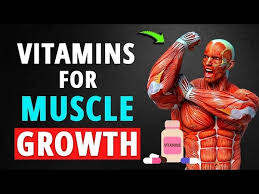Building and maintaining muscle mass requires a combination of proper nutrition, regular exercise, and adequate rest. While protein is often emphasized for muscle health, several vitamins and minerals also play important roles in muscle function and recovery. Here are some key vitamins and minerals for muscles:
Vitamin D: Essential for muscle function and strength. It plays a role in muscle protein synthesis and helps maintain muscle mass. Vitamin D deficiency has been linked to muscle weakness and an increased risk of falls.
Vitamin B6: Important for protein metabolism and the synthesis of neurotransmitters that are involved in muscle contraction. It also helps regulate glycogen storage, which provides energy for muscle activity.
Vitamin B12: Necessary for the formation of red blood cells, which deliver oxygen to muscles during exercise. It also plays a role in energy metabolism and muscle function.
Vitamin C: Acts as an antioxidant and supports collagen synthesis, which is important for the structure of muscles, tendons, and ligaments. It may also help reduce muscle soreness after exercise.
Vitamin E: Another antioxidant that protects muscles from oxidative damage during exercise. It may also enhance muscle recovery and reduce inflammation.
Magnesium: Required for muscle contraction and relaxation. It helps regulate muscle function and plays a role in energy metabolism.
Calcium: Essential for muscle contraction and nerve transmission. It helps regulate muscle tone and strength.
Potassium: Important for maintaining fluid balance and electrolyte levels in muscle cells. It helps regulate muscle contractions and prevent muscle cramps.
Iron: Necessary for the production of hemoglobin, which carries oxygen to muscles. Iron deficiency can lead to fatigue and decreased exercise performance.
Zinc: Supports protein synthesis and immune function, both of which are important for muscle repair and recovery after exercise.


No comments:
Post a Comment